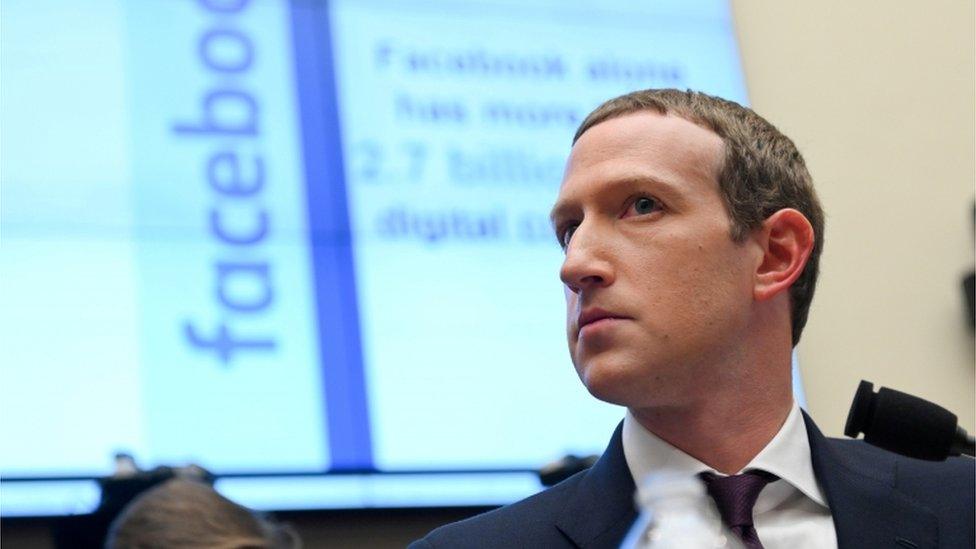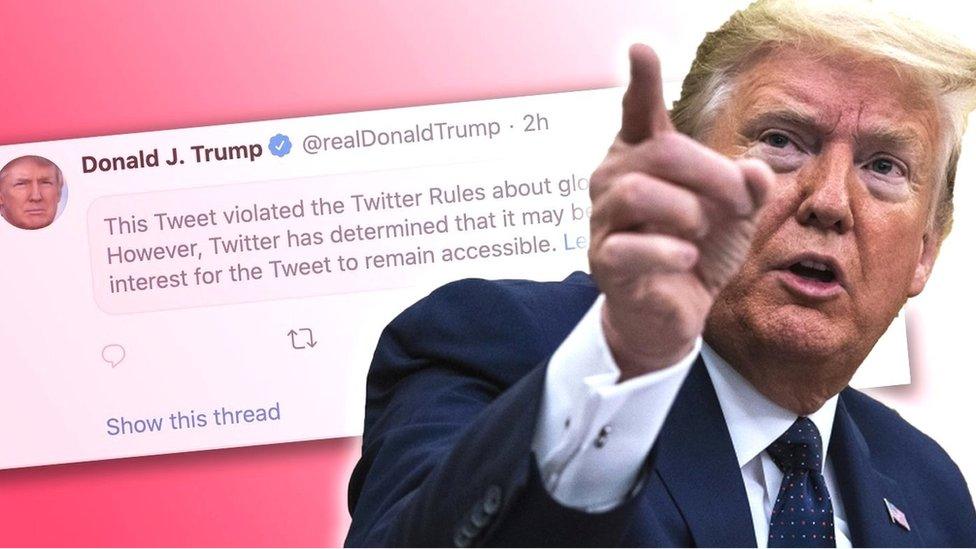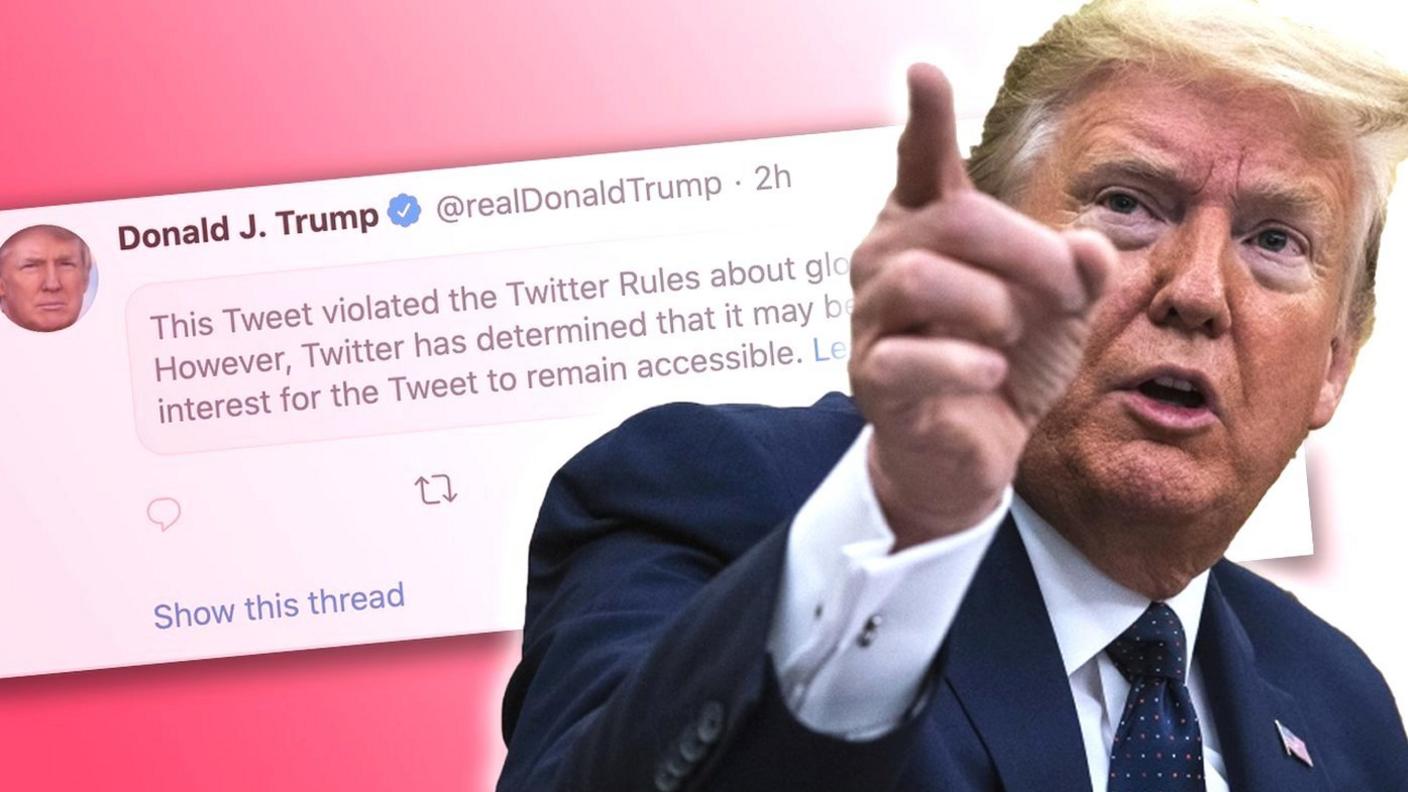Facebook staff anger over Trump post
- Published

Mr Zuckerberg is reported to have spoken to President Trump on Friday by phone
Facebook staff have spoken out against the tech giant's decision not to remove or flag a controversial post by US President Donald Trump last week.
Mr Trump took to Facebook to repeat a tweet about the widespread protests in Minneapolis, following the death of George Floyd in police custody.
Twitter had placed a warning over the content, which it said "glorified violence", but Facebook said it did not violate its company policy.
Some staff said they were ‘ashamed’.
The president said he would "send in the National Guard", and warned that "when the looting starts, the shooting starts."
The post remains untouched on Facebook after founder Mark Zuckerberg said it did not violate the company’s policy around incitement of violence.
A "virtual walkout" is taking place today, with some employees leaving an out-of-office message explaining that they are protesting., external
“People can agree or disagree on where we should draw the line, but I hope they understand our overall philosophy is that it is better to have this discussion out in the open, especially when the stakes are so high,” Mr Zuckerberg wrote in a post on the platform, external.
“I disagree strongly with how the President spoke about this, but I believe people should be able to see this for themselves because ultimately accountability for those in positions of power can only happen when their speech is scrutinized out in the open.”
"Silence is complicity"
Several employees expressed their frustration at the decision, on social media.

Twitter hid the content of Mr Trump's post behind by a warning label, but Facebook has not done likewise
“Facebook's inaction in taking down Trump's post inciting violence makes me ashamed to work here,” Lauren Tan, a software engineer wrote.
“I absolutely disagree with it... Silence is complicity.”
Allow X content?
This article contains content provided by X. We ask for your permission before anything is loaded, as they may be using cookies and other technologies. You may want to read X’s cookie policy, external and privacy policy, external before accepting. To view this content choose ‘accept and continue’.
Others suggested that Facebook should have made an exception to the policy, given its context.
“We need to strive harder as a company, and industry, to have our Black colleagues’ and fellow citizens’ backs so that they are not having to face down institutionalised societal violence and systemic oppression alone,” added David Gillis, a director in product design at Facebook.
Other employees used the company’s internal messaging system to try to raise their concerns, The Verge reports, external.
Facebook said it "recognised the pain" many staff were feeling.
"We encourage employees to speak openly when they disagree with leadership. As we face additional difficult decisions around content ahead, we'll continue seeking their honest feedback," a spokesperson said.
Joseph Evans, head of tech at Enders Analysis said that staff at tech firms do speak out against their employers' decisions on occasion; in 2018 Google staff walked out in protest against the firm's treatment of women."Part of the appeal of working for these companies is that the employees feel they're changing the world, and hopefully for the better," he said.
"So the tech giants have to balance avoiding regulatory crackdowns, keeping profits high, and attracting and retaining their highly-skilled workforce."
Donald Trump and Mark Zuckerberg spoke on the phone on Friday.
It’s unknown what was discussed, but both sides called the conversation productive, according to Axios news website, external.
"We stand against racism"
Today, Facebook announced that it will donate $10m (£8m) to “efforts committed to ending racial injustice.”
“We hear you, we see you and we are with you,” the company said on social media.
"We stand against racism. We stand with our Black community - and all those working toward justice in honour of George Floyd, Breonna Taylor, Ahmaud Arbery and far too many others whose names will not be forgotten.”
It is unclear where the $10m will go, or how it will be distributed.
- Published29 May 2020

- Published29 May 2020
